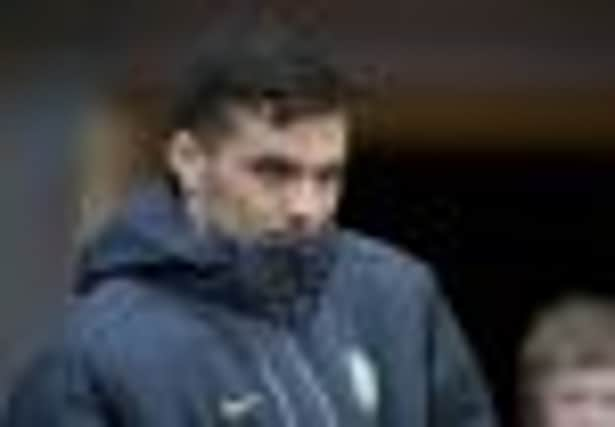Celtic teenager Tony Watt is latest to set bar high with goalscoring debut


Mikey Wilson, a teenager reckoned to be as good as team-mate Ryan Giggs, suffers due to a misplaced pass from the Welsh winger just seconds after coming on for his ‘Manchester United’ debut, and, in seeking to recover the ball, breaks his own leg as well as that of an opponent. So begins a dark tale of bitterness and obsession.
Happily, Celtic teenager Tony Watt enjoyed a more productive first game for the club he has supported for the majority of his young life. Still only 18, the striker from Coatbridge needed only five minutes after coming on as substitute against Motherwell on Sunday to establish himself as a 13th equal top scorer in this season’s Scottish Premier League.
Advertisement
Hide AdAdvertisement
Hide AdIt also permitted him entry into the ‘memorable debut’ gang, which, for Celtic, is a varied and not-all-that exclusive group. Ramon Vega, perhaps surprisingly, scored twice on his debut in a 6-0 win against Aberdeen in 2000, although he was only on loan from Tottenham Hotspur at the time. Less surprising was the late Phil O’Donnell’s brace for Celtic from midfield on his debut, against Partick Thistle, in 1994, while Billy Stark and Andy Walker shared debut doubles in their first competitive appearance for the Parkhead side, at Morton in 1987.
Then there is the case of Barry Robson, who, four years ago, came off the bench against Aberdeen to score with his first touch for Celtic, from a free-kick. Jorge Cadete took a fraction longer to score – about 30 seconds – when coming on as substitute, again against Aberdeen, in April 1996.
It is notable, however, to have made such a splash in a first ever senior appearance, although others have also experienced this thrill. Widening the scope to include non-Celtic players, Willie Bauld made Hearts fans sit up and take notice in 1948 as he scored three times on his debut in a 6-1 win over East Fife, in a game which also marked the first occasion the terrible trio of Bauld, Alfie Conn and Jimmy Wardhaugh lined up together. For a follow-up trick, Bauld scored another hat-trick in his next game against Queen of the South.
Seven years earlier, Hibs legend Gordon Smith also enjoyed a debut to remember, scoring a hat-trick in a 5-3 triumph over Hearts at Tynecastle.
Then there is Alan Shearer, whose league debut for Southampton, at the age of 17, was celebrated with the scoring of three of his side’s four goals against Arsenal that day.
Little, however, can beat Jim Dyet’s entrance for the old Stirling-based side King’s Park, for whom he scored eight goals in a 12-2 win over Forfar Athletic in 1930. Not even the great Len Shackleton could emulate this feat, falling two goals short by bagging just the double hat-trick when he made an impressive first start for Newcastle United in 1946.
In Glass’s novel, Wilson is only 17 years and five months old when he prepares to come on against Oldham Athletic, for his ill-fated first appearance. “With a twitch of his head and a wave in the direction of the battlefield, the Gaffer [Alex Ferguson] tells you you warm up...And then it happens, the real beginning of your life.” With Neil Lennon sitting in the stand as he begins a two-game suspension, it was John Mjallby who signalled the start of Watt’s life as a footballer, even if, to those in the know at Celtic, he has been held in great esteem for a while now.
For Wilson, as depicted in the novel Bring Me the Head of Ryan Giggs, his career is over before it truly starts. He never plays another game, and insult is added to injury when he collects a red card for the clumsy challenge which ends two careers. While many observers were cautious about reading too much into Watt’s cameo, he is considered something a bit special.
Advertisement
Hide AdAdvertisement
Hide AdWhatever happens now, Watt will simply be relieved that he has handled such a high-pressure occasion with aplomb. It certainly made up for being suspended from last night’s SFA Youth Cup final against Queen of the South. His brace sent Celtic historians scurrying to the ledgers. Tom Campbell yesterday recalled the tale of Tommy McInally, the subject of the book “Bad Bhoy” written by David Potter.
McInally has been described as “making Jackie Dziekanowski look like Paul Lambert”. However, despite his problems away from the park, he began his Celtic career like a whirlwind, scoring three goals on his debut against Clydebank in the first game of the 1919-20 season. He followed this up with two goals in his next game and then a single strike in his third appearance, against Hamilton Accies. “It was a case of going downhill fast,” joked Campbell yesterday. McInally’s career wasn’t necessarily one of diminishing returns, although he did often frustrate manager Willie Maley and died aged just 55, having endured a struggle with alcoholism.
Even scoring a hat-trick on your Celtic debut might come in as a poor second to scoring a last-minute winner against Rangers, as Mike Haughney managed in a Scottish League Cup match in August 1949. Then there is the flip-side to such joy. Willie Garner scored two own goals in his first game for the Parkhead club against St Mirren in August 1981.
Garner, sadly, only went onto play another two matches for Celtic – although he did become Alex Ferguson’s first assistant at Aberdeen. Watt, at least, seems certain to shine on for some time yet